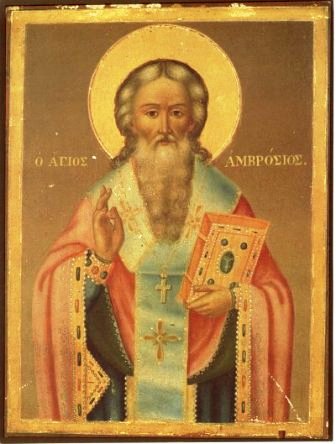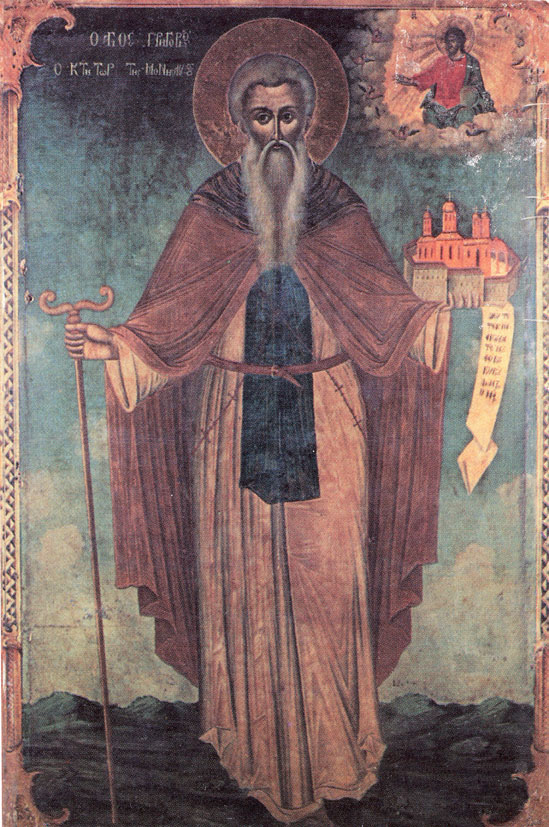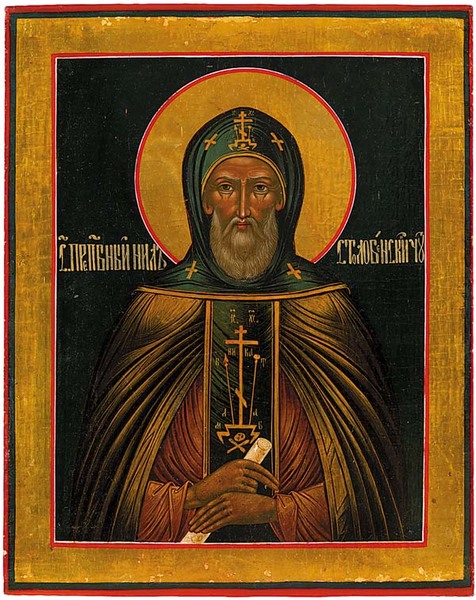|
|
St Ambrose, Bishop of Mediolanum (Milan) This great Father of the Orthodox Church was of eminent parentage. His father was the imperial governor of Gaul and Spain, and a pagan, while his mother was a Christian. While he was still in his cradle, a swarm of bees once settled on him, left some honey on his lips and flew off; and, while still a child, he thrust out his hand and said prophetically: "Kiss it, for I shall be a bishop!" On the death of his father, the Emperor made him governor of Liguria, of which province Milan was the chief city. When the bishop of Milan died, there was great dissention between the Orthodox Christians and the heretical Arians about the choice of a new bishop. Ambrose went into the church to keep order, this being his responsibility. Thereupon, a child at its mother"s breast cried out: "Ambrose for bishop!" All the people took this to be the voice of God, and unanimously elected Ambrose as their bishop, although it was against his will. Ambrose was baptised, and passed through all the necessary ranks in one week, and was consecrated bishop. In this capacity, he strengthened the faith of the Orthodox, restrained heretics, adorned churches, spread the Faith among the pagans, wrote many instructive books and was an example of a true Christian and a true shepherd. He also composed the Te Deum, the great hymn of thanksgiving. This renowned hierarch, who was visited by people from distant lands for his wisdom and gracious words, was very austere in his personal life, being no stranger to toil and full of good works. He slept little, worked and prayed constantly and fasted every day except Saturday and Sunday. God therefore permitted him to witness many of His wonders, and to perform many himself He discovered the relics of Ss Protasius, Gervasius, Nazarius and Celsus (see Oct. 14th). Humble before lesser men, he was fearless before the great. He reproached the Empress Justina for heresy, cursed Maximus for tyranny and murder and forbade the Emperor Theodosius to enter a church until he had repented of his sin. He refused to meet the powerful Eugenius, the self-styled Emperor. God granted this man, who was so pleasing to Him, such grace that he could raise the dead, drive demons from men, heal the sick of every ailment and see into the future. He died peacefully at daybreak on Easter Day in the year 397. This great Father of the Orthodox Church was of eminent parentage. His father was the imperial governor of Gaul and Spain, and a pagan, while his mother was a Christian. While he was still in his cradle, a swarm of bees once settled on him, left some honey on his lips and flew off; and, while still a child, he thrust out his hand and said prophetically: "Kiss it, for I shall be a bishop!" On the death of his father, the Emperor made him governor of Liguria, of which province Milan was the chief city. When the bishop of Milan died, there was great dissention between the Orthodox Christians and the heretical Arians about the choice of a new bishop. Ambrose went into the church to keep order, this being his responsibility. Thereupon, a child at its mother"s breast cried out: "Ambrose for bishop!" All the people took this to be the voice of God, and unanimously elected Ambrose as their bishop, although it was against his will. Ambrose was baptised, and passed through all the necessary ranks in one week, and was consecrated bishop. In this capacity, he strengthened the faith of the Orthodox, restrained heretics, adorned churches, spread the Faith among the pagans, wrote many instructive books and was an example of a true Christian and a true shepherd. He also composed the Te Deum, the great hymn of thanksgiving. This renowned hierarch, who was visited by people from distant lands for his wisdom and gracious words, was very austere in his personal life, being no stranger to toil and full of good works. He slept little, worked and prayed constantly and fasted every day except Saturday and Sunday. God therefore permitted him to witness many of His wonders, and to perform many himself He discovered the relics of Ss Protasius, Gervasius, Nazarius and Celsus (see Oct. 14th). Humble before lesser men, he was fearless before the great. He reproached the Empress Justina for heresy, cursed Maximus for tyranny and murder and forbade the Emperor Theodosius to enter a church until he had repented of his sin. He refused to meet the powerful Eugenius, the self-styled Emperor. God granted this man, who was so pleasing to Him, such grace that he could raise the dead, drive demons from men, heal the sick of every ailment and see into the future. He died peacefully at daybreak on Easter Day in the year 397.Our Holy Father Gregory the Hesychast A Serb by birth, he was the founder of the monastery of St Nicolas on the Holy Mountain, which is known by the name of Grigoriou after him. He built himself a cell about four hours" joumey from the monastery, where he wept over his sins and prayed. In 1761, a serious fire broke out in the monastery, and at that time some of the monks took his relics to Serbia. This man of God entered into eternal rest in 1406. A Serb by birth, he was the founder of the monastery of St Nicolas on the Holy Mountain, which is known by the name of Grigoriou after him. He built himself a cell about four hours" joumey from the monastery, where he wept over his sins and prayed. In 1761, a serious fire broke out in the monastery, and at that time some of the monks took his relics to Serbia. This man of God entered into eternal rest in 1406.Our Holy Father Nilus of Stolobnoye A worker on the land, born in Novgorod, he went off into a lonely place and survived on plants and gleanings. He was instructed by a voice from on high to move to the island of Stolobnoye (Table Island). Once, some robbers burst into his cell, and were immediately blinded. He dug his own grave close to his cell, and wept over it every day. He entered into eternal rest in the kingdom of Christ in 1554, and his wonderworking relics are preserved in the place where he led his life of fasting. A worker on the land, born in Novgorod, he went off into a lonely place and survived on plants and gleanings. He was instructed by a voice from on high to move to the island of Stolobnoye (Table Island). Once, some robbers burst into his cell, and were immediately blinded. He dug his own grave close to his cell, and wept over it every day. He entered into eternal rest in the kingdom of Christ in 1554, and his wonderworking relics are preserved in the place where he led his life of fasting. |